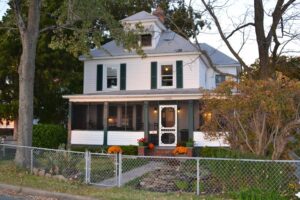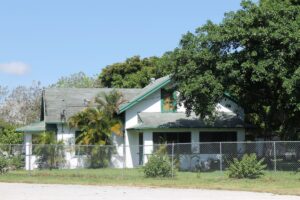
Soundproofing is a crucial element of a comfortable home, especially for those who live in noisy neighborhoods or with loud neighbors. While many assume that newer homes are more soundproof than older ones, this is not necessarily true. In fact, there’s a common misconception that older homes are less soundproof due to their age and potential wear and tear. Is this true? Let’s find out. “Are older buildings more soundproof?
There’s no specific answer to this question. However, the truth is that older houses may actually be more soundproof than newer ones for several reasons such as thicker walls, solid wood doors, and natural materials.
In this article, we’d be discussing more about soundproofing in older houses and newer houses. Kindly read on to find out.
Contents
Are older houses more soundproof?
Older houses were typically built with thicker walls than newer homes. This extra thickness can help to block sound transmission, making the home more soundproof.
In addition, older homes often use natural materials such as stone or brick for their walls, which have better sound-absorbing properties than the synthetic materials commonly used in newer homes.
Solid wood doors were also more common in older homes, which are more effective at blocking sound than hollow-core doors commonly used in newer homes. This is because solid wood doors are denser and more substantial, reducing the amount of sound that can pass through.
That being said, it’s important to note that regardless of the home’s age, several factors can affect its soundproofing, including wall thickness, type of construction, windows, doors, and insulation. Therefore, a newer home that has been constructed with these factors in mind may be more soundproof than an older home that lacks these features.
Why are Older Buildings More Soundproof?

Basically, the reasons why we speculated that older houses are more soundproof are due to a few reasons that have been quite explained above. The reasons will be listed below for you to note.
- Thick walls.
- Use of natural materials.
- Solid wood doors.
- Multiple layers of flooring.
- Location.
Thick walls
Thick walls are one of the most important factors in soundproofing a house. The thicker the walls, the more sound they can absorb before it passes through to the other side. Many older houses were built with solid masonry or brick walls, which are excellent at blocking sound.
Additionally, some older houses have plaster walls that are thicker than modern drywall, which can also provide good soundproofing.
Use of natural materials
The use of natural materials can also contribute to soundproofing a house. Materials such as stone, brick, and hardwood are denser and heavier than synthetic materials, which can help absorb sound.
Additionally, some natural materials have inherent sound-deadening properties. For example, cork flooring can help reduce noise levels by absorbing sound waves.
Solid wood doors
Solid wood doors are another feature commonly found in older homes that can help with soundproofing. It is a dense material that can absorb sound waves, and a properly fitted door with a tight seal can block out noise from adjacent rooms or the outdoors.
Location
Location is also a factor in soundproofing. Older houses were often built in quieter, more secluded areas before urbanization and suburban sprawl. These areas tend to have less traffic and noise pollution, making it easier to block out external sounds.
Multiple layers of flooring
Finally, multiple layers of flooring can help with soundproofing. Older houses often have hardwood floors, which can be thicker than modern flooring materials.
Also, older houses may have a layer of subflooring under the finished flooring, which can provide an extra layer of insulation against sound.
Also read: Is it illegal to play loud music after 11 pm?
What are the factors that affect soundproofing in houses?
There are several factors that can affect soundproofing in houses, regardless of whether they are old or new. These include:
- Wall thickness.
- Type of construction.
- Windows.
- Doors.
- Insulation.
Wall thickness
Wall thickness plays a crucial role in soundproofing. The thicker the wall, the more sound it can absorb before it passes through to the other side. This is because thicker walls have more mass, and mass is a key factor in soundproofing.
Solid masonry or brick walls are excellent at blocking sound, while drywall and wooden frame walls are less effective. However, adding additional layers of drywall or insulation to a wall can also help to increase its soundproofing capabilities.
Type of construction
The type of construction can also impact soundproofing. Different building materials have different densities, and dense materials are better at blocking sound.
Concrete and masonry are very dense materials, and as such, they are more effective at blocking sound than lightweight materials such as wood or drywall.
Additionally, older homes that were built before modern construction practices may have thicker walls and better soundproofing.
Doors and windows
Doors and windows are also important factors in soundproofing. A solid wood door with a tight seal can block out noise from adjacent rooms or the outdoors. Hollow core doors, on the other hand, are not as effective at blocking sound.
Similarly, windows with double or triple panes of glass and airtight seals are more effective at blocking sound than single-pane windows. Installing weatherstripping around doors and windows can also help to reduce sound transmission.
Insulation
Lastly, Insulation can also play a significant role in soundproofing. Insulation helps to absorb sound waves and prevent them from passing through walls and ceilings.
Adding insulation to walls, floors, and ceilings can significantly reduce the amount of sound that passes between rooms or from outside.
However, it’s important to note that not all insulation is created equal, and some types are more effective at soundproofing than others.
Tips for improving soundproofing in older houses
Improving soundproofing in older houses can be a challenge, but there are several tips that homeowners can try to reduce noise transmission and create a quieter living environment:
Add weatherstripping to doors and windows
Weatherstripping can help to create an airtight seal around doors and windows, reducing the amount of sound that can pass through these openings.
The more airtight the seal, the less sound will be able to penetrate through the gaps. However, there are different types of weatherstripping with their own advantages.
For example, adhesive-backed foam tape is easy to install and affordable, but may not be as durable as other types of weatherstripping. Rubber weatherstripping is more durable and effective at reducing sound transmission but may be more difficult to install.
When installing weatherstripping, it’s important to ensure that it is applied correctly and tightly sealed.
Use acoustic sealant
Acoustic sealant is a special type of sealant that is designed to reduce sound transmission. It has a higher density and viscosity, allowing it to fill gaps more effectively and provide a more airtight seal.
It can be used around windows, doors, and other openings to help reduce noise levels. When using acoustic sealant, it’s important to ensure that the area to be sealed is clean and dry, as this will help the sealant to adhere more effectively.
Install soundproof curtains
Heavy curtains can help to absorb sound waves and prevent them from passing through windows. Look for curtains made of dense materials such as velvet or heavy cotton.
Add rugs or carpets
Hard surfaces such as hardwood floors or tiles can reflect sound waves, making them more difficult to block. Adding rugs or carpets can help to absorb sound and create a more peaceful living space.
Install acoustic panels
Acoustic panels can be installed on walls or ceilings to absorb sound waves and reduce noise levels. They come in a variety of sizes and styles and can be a great option for improving soundproofing in specific areas of the house, such as a home office or music room.
Acoustic panels can also be used in homes to improve soundproofing and reduce noise transmission between rooms or from external sources.
Upgrade windows
Older homes often have single-pane windows, which are less effective at blocking sound than double or triple-pane windows. Upgrading to newer windows can help to reduce noise levels.
Consider adding extra insulation
Extra insulation is an effective way to improve soundproofing in older houses. Insulation helps to reduce the amount of sound that can pass through walls, ceilings, and floors by absorbing and dissipating sound waves.
It also helps to maintain a more consistent temperature inside the house, reducing the need for heating and cooling and providing additional energy savings.
Look for insulation that is specifically designed for soundproofing, such as mineral wool or fiberglass batts.
Conclusion – Are Older Buildings More Soundproof?
Older buildings may be more soundproof than newer ones due to factors such as thicker walls, solid wood doors, and the use of natural materials.
However, regardless of the home’s age, several factors can affect its soundproofing, including wall thickness, type of construction, windows, doors, and insulation.
Having known all of these, the tips that can assist you in improving soundproofing in older houses have been shared with you in this blog post. We hope they are of help and you make good use of the information provided.
